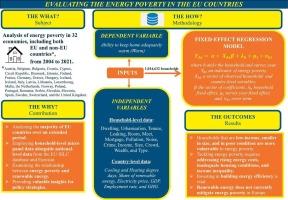评估欧盟国家的能源贫困状况
IF 13.6
2区 经济学
Q1 ECONOMICS
引用次数: 0
摘要
人们日益认识到,能源贫困是一个多方面的全球性挑战,它源于有限的收入、高昂的能源成本和低效的住房。这一问题对不同社会群体和地区的影响并不均衡,即使在欧洲内部也是如此。本文研究了 2004 年至 2021 年期间 32 个经济体的能源贫困问题,其中包括欧盟成员国和几个非欧盟的欧洲国家。通过分析欧盟-SILC 数据库和欧盟统计局(Eurostat)的微观数据,研究发现低收入家庭、小家庭和居住条件拥挤的家庭尤其容易陷入能源贫困。有趣的是,研究发现可再生能源无助于缓解欧洲的能源贫困。基于这些结果,研究呼吁立即采取政策措施,改善住房条件,降低电费,尤其是经济困难家庭的电费,以有效解决能源贫困问题。本文章由计算机程序翻译,如有差异,请以英文原文为准。

Evaluating the energy poverty in the EU countries
The domain of energy poverty is increasingly recognised as a multifaceted global challenge stemming from limited income, high energy costs, and inefficient housing. The issue affects different social groups and regions unevenly, even within Europe. This paper investigates energy poverty across 32 economies, including EU member states and several non-EU European countries, over the period from 2004 to 2021. By analysing micro-level data from the EU-SILC database and Eurostat, the study identifies that low-income households, smaller households, and those living in overcrowded conditions are particularly vulnerable to energy poverty. Interestingly, the research finds that renewable energy does not contribute to alleviating energy poverty in Europe. Based on these results, the study calls for immediate policy measures to improve housing conditions and lower electricity costs, especially for economically disadvantaged households, to effectively address energy poverty.
求助全文
通过发布文献求助,成功后即可免费获取论文全文。
去求助
来源期刊

Energy Economics
ECONOMICS-
CiteScore
18.60
自引率
12.50%
发文量
524
期刊介绍:
Energy Economics is a field journal that focuses on energy economics and energy finance. It covers various themes including the exploitation, conversion, and use of energy, markets for energy commodities and derivatives, regulation and taxation, forecasting, environment and climate, international trade, development, and monetary policy. The journal welcomes contributions that utilize diverse methods such as experiments, surveys, econometrics, decomposition, simulation models, equilibrium models, optimization models, and analytical models. It publishes a combination of papers employing different methods to explore a wide range of topics. The journal's replication policy encourages the submission of replication studies, wherein researchers reproduce and extend the key results of original studies while explaining any differences. Energy Economics is indexed and abstracted in several databases including Environmental Abstracts, Fuel and Energy Abstracts, Social Sciences Citation Index, GEOBASE, Social & Behavioral Sciences, Journal of Economic Literature, INSPEC, and more.
 求助内容:
求助内容: 应助结果提醒方式:
应助结果提醒方式:


